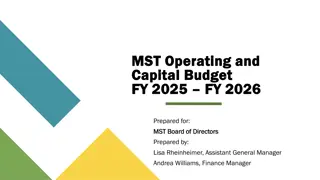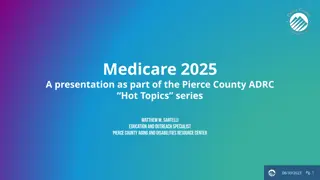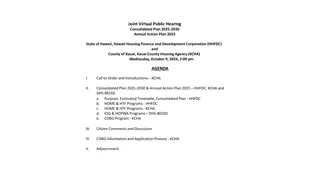
English Conditional Sentences in Medical Contexts
Explore the detailed explanation of zero, first, second, and third conditional sentences in English grammar with examples and how they are used in medical expressions. Learn about real present and future conditions, hypothetical scenarios, and unreal past situations within the context of medical settings.
Uploaded on | 0 Views
Download Presentation

Please find below an Image/Link to download the presentation.
The content on the website is provided AS IS for your information and personal use only. It may not be sold, licensed, or shared on other websites without obtaining consent from the author. If you encounter any issues during the download, it is possible that the publisher has removed the file from their server.
You are allowed to download the files provided on this website for personal or commercial use, subject to the condition that they are used lawfully. All files are the property of their respective owners.
The content on the website is provided AS IS for your information and personal use only. It may not be sold, licensed, or shared on other websites without obtaining consent from the author.
E N D
Presentation Transcript
Intelligent Medical Systems Department Intelligent Medical Systems Department Subject: Subject: English Language English Language Class: Second Class: Second Lecturer: Lecturer: MSC. MSC. Sakina Sakina Hussain Lecture: ( Lecture: ( 4 4) ) English Grammar: Conditional English Grammar: Conditional sentences Technical English vocabulary Technical English vocabulary - - text including Medical expressions. expressions. Hussain Alsuwaydi Alsuwaydi sentences text including Medical Study Year: 2024-2025
Detailed Explanation of Conditional Sentences 1. Zero Conditional (Real Present Condition) Structure: If + present simple, present simple Structure: If + present simple, present simple Use: The zero conditional is used to talk about things that are always true or facts. It describes situations where, when one condition is met, the result always happens. There is no chance or uncertainty it s a certain outcome. For example: -If you heat water to 100 C, it boils. (This is always true. Every time you heat water to 100 C, it will boil.) In the zero conditional, both the condition and the result are in the present tense. Examples: If you mix red and blue, you get purple. If you eat too much sugar, you gain weight.
2. First Conditional (Real Future Condition) Structure: If + present simple, will + base verb If + present simple, will + base verb Use: This conditional is used for real or possible situations in the future. It expresses a likely event that could happen if the condition is fulfilled. Examples: If I finish work early, I will call you. If the weather improves, we will go to the park.
3. Second Conditional (Unreal or Hypothetical Present or Future Condition) Structure: If + past simple, would + base verb If + past simple, would + base verb Use: This conditional is used to talk about hypothetical or unlikely situations in the present or future. It expresses what might happen if something were true, but it is not. It often refers to dreams, wishes, or imagined scenarios. Examples: If I were you, I would take that job. (Note: If I were is used instead of if I was in formal English.)
4. Third Conditional (Unreal Past Condition) Structure: If + past perfect, would have + past participle If + past perfect, would have + past participle Use: This conditional refers to past situations that did not happen. It expresses regret or speculation about the past, indicating what would have happened if the condition had been met. Examples: If I had known about the meeting, I would have attended. If she had studied harder, she would have passed the test.
Technical English Vocabulary Technical English Vocabulary Medical Expressions Medical Expressions 1. Diagnosis Diagnosis: -A diagnosis is made after the doctor has assessed a patient s symptoms, medical history, and test results. Example: After the MRI, the diagnosis was a torn ligament in the knee. 2. Prognosis Prognosis: -A prognosis is an estimate of the likely course or outcome of a disease. It often involves predictions about recovery, complications, or the long-term impact of a condition. Example: The prognosis for recovery after surgery is excellent, with most patients returning to normal activity within six weeks.
3. Symptom Symptom: Symptoms are the signs or manifestations of a disease or condition that a patient feels or experiences. Example: Common symptoms of the flu include fever, cough, and body aches. 4 4- -Therapy Therapy: Therapy refers to the treatment of a disease or condition. It could involve medication, physical therapy, psychological therapy, or other forms of treatment. Example: The patient underwent chemotherapy to treat cancer. 5. Procedure Procedure: A medical procedure is an action or series of actions carried out to treat a patient, such as surgery, diagnostic tests, or therapeutic interventions. Example: The doctor explained the procedure for the kidney transplant to the patient.
6. Antibiotic Antibiotic: Antibiotics are medicines used to fight bacterial infections. They do not work against viral infections. Example: The doctor prescribed antibiotics to treat the patient s bacterial infection. 7. Chronic Chronic: Chronic conditions are long-term illnesses that last for a year or more and require ongoing management. Example: Asthma is a chronic condition that requires lifelong management with inhalers. 8. Acute Acute: Acute refers to a condition that comes on suddenly and is typically severe in nature but often short-lived. Example: Acute pain in the chest can be a sign of a heart attack.
9. Contagious Contagious: Contagious diseases can be transmitted from one person to another through direct or indirect contact. Example: Chickenpox is highly contagious, especially among children. 10. Vaccination Vaccination: Vaccination is the administration of a vaccine to stimulate the body s immune system to defend against specific diseases. Example: Vaccination programs have significantly reduced the incidence of polio worldwide.
Medical Vocabulary Exercise Match the medical term with its definition: 1. Antibiotic - C 2. Diagnosis -D 3. Chronic -B 4. Contagious -A 5. Prognosis E A. A disease that is spread from one person to another. B. The long-term course of a disease. C. A drug used to treat bacterial infections. D. The identification of a medical condition based on symptoms and tests. E. A condition that lasts for a long time and usually requires ongoing treatment.





















